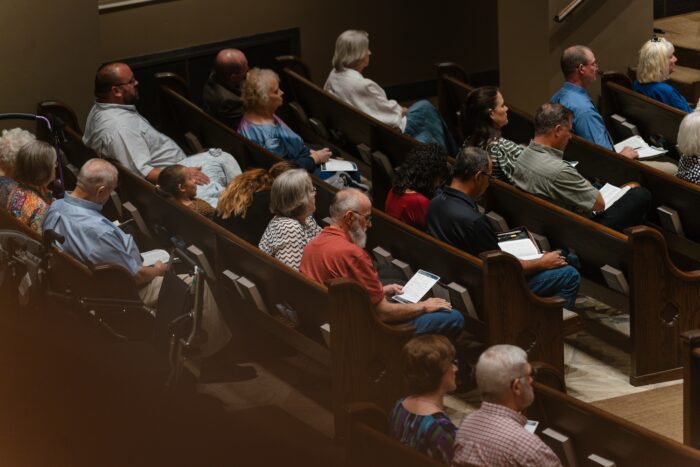The time for the Convention Sermon had arrived at the 1987 annual meeting of the Southern Baptist Convention in Kansas City. At the height of the theological battles shaking the convention at the very apex of the conservative resurgence, Vines boldly stepped to the podium and announced his text, 2 Timothy 3:14-4:13. His sermon title was: “A Baptist and His Bible.” It would become a defining moment in the history of the Southern Baptist Convention (SBC).
A native of Carrollton, GA, Vines began preaching when he was 16 years old. He is a graduate of Mercer University and New Orleans Baptist Theological Seminary and holds a DMin degree from Luther Rice Seminary and a PhD in Preaching from Southwestern Baptist Theological Seminary which he earned as an octogenarian. From his early years as a pastor until his retirement in 2006 from First Baptist Church, Jacksonville, FL, Vines developed a legacy of expository preaching through books of the Bible. He first became known in the Southern Baptist Convention for a sermon he preached at the Alabama Pastors’ Conference in 1977 entitled “Our Ascended Lord.” Many consider it his most famous sermon.
Vines had prepared for this moment with meticulous care, not only immersing himself in the biblical text but also delving into the history of Southern Baptist theological convictions regarding the inerrancy of Scripture which had been central to the denomination’s identity.
With this foundation, Vines launched into his sermon, eloquently and passionately defending the sacred trust Baptists place in Scripture. His sermon, based on 2 Timothy 3:14-4:13, centered on three core themes: The Intention, The Inspiration, and The Implications of the Bible.
The impact of Vines’ words was immediate and powerful. The sermon was a masterful blend of exposition, illustration, and application. Vines’ introduction was a harbinger of what was to come: “In beautiful human language resplendent with divine revelation Paul sets before us the Bible’s doctrine concerning itself. He quickly takes us to the Counseling Room and shows us the intention of the Bible; the Classroom and shows us the inspiration of the Bible; then the Crisis Room and shows us the implications of the Bible.” His vivid illustrations, such as: “Baptists are early taught to love and respect the Bible. On a hot summer day, at Vacation Bible School, little Baptist feet carry little Baptist bodies into the awesome church auditorium. Billy Baptist stands before his little classmates and with trembling hands holds a Bible…” symbolized the deep, lifelong reverence for the Bible instilled in the hearts of Southern Baptists.
But it was his forceful condemnation of “destructive criticism”—which he described as the “thief” that seeks to undermine faith—that struck at the heart of the theological battle. In a fiery rebuke, he denounced the cold, faith-destroying analysis of Scripture as “Not reverent, believing scholarship, but destructive, faith-wrecking criticism. That criticism which clips faith’s wings with reason’s scissors. That kind of destructive scholarship which submits the warm wonder of the Word to the cold, merciless analysis of unbelief.” Vines’ approach to the issue of biblical authority was methodical and passionate, reflecting both his deep scholarship and heartfelt conviction.
The response was overwhelming. The convention hall erupted in applause, cheers, and standing ovations—testament to the deep resonance of Vines’ message. This sermon didn’t just reflect the convictions of the SBC, it ignited the very heart of the conservative resurgence. Carl L. Kell and L. Raymond Camp later hailed it as “The finest national statement on biblical inerrancy we found during our research for this study.” It was a watershed moment that energized the conservative movement and solidified the conviction that Scripture must be treated with unwavering authority.
Vines’ message carried not only theological weight but also prophetic significance. Just after the sermon, Dr. Charles Stanley embraced Vines, prophetically whispering, “You will be the next president of the Southern Baptist Convention.” And indeed, in the following year, Vines was elected SBC president, serving for two terms and cementing his legacy as a key figure in the conservative resurgence.
The lasting power of “A Baptist and His Bible” was not only in its immediate effect but also in its enduring legacy. Later published in booklet form, the sermon received high praise from figures like Adrian Rogers, who described it as a stirring demonstration of scholarship, conviction, and love for God’s Word. Vines’ impassioned defense of the Bible marked a pivotal moment in the SBC’s history—a declaration that the Bible, as the inspired and inerrant Word of God, was the cornerstone upon which the future of the denomination would stand.
In that moment, Jerry Vines didn’t just preach a sermon. He delivered a clarion call for Southern Baptists to reclaim their trust in Scripture, and in doing so, he helped shape the trajectory of the SBC for generations to come.
Among the thronged thousands in attendance that day was a young pastor in his first church. As I listened, I vividly recalled a fall Sunday night in 1973 when I was a teenager listening to my pastor preach during the evening service at West Rome Baptist Church in Rome, GA. I went forward in the invitation at the end of the service to let my pastor know God had called me to preach. My pastor’s name—Jerry Vines.








